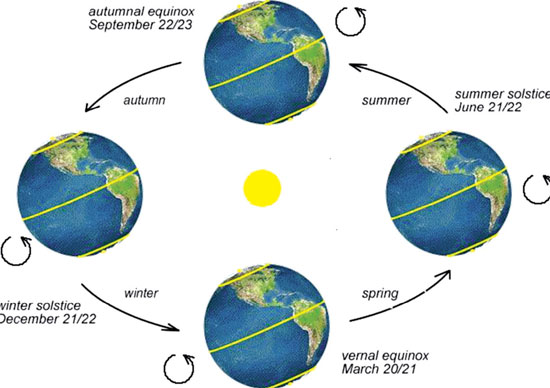March
by Sumana Saparamadu
March is named after Mars the god of war. Romans thought that Mars
could do almost anything, because he was so strong.
Mars was, to the Romans, a terrifying and mighty figure who dashed by
in a chariot drawn by two horses. He held in one hand a burnished
(highly polished) shield and a long spear in the other. The Romans said
that as Mars raised his head, lightning played about his great helmet.
March is an important month the world over. On March 21 the Sun is
directly over the equator. This happens only twice a year, on March 21
and September 23. These two days are called equinoxes. March 21 is the
vernal equinox as it marks the beginning of spring in the northern
hemisphere. (Vernal means connected with spring).
In Iran the new year begins on March 21. In the ancient Roman
calendar March was the first month of the year until Julius Caesar
reformed the calendar and added two months before March. In the ancient
calendar the New Year must have begun on or near the vernal equinox as
it is in Iran even today.

March 1 is the Feast Day of St. David, the patron saint of Wales.
March 2 is a very important day in our country's history, we lost our
independence that day.
On that day in 1815, the Kandyan Convention was signed by the British
Governor and the Adigars of the Kingdom of Kandy and the Kingdom was
handed over to the British. From that day in 1815 up to 1948 Ceylon by
which name the British called our country, was a colony of the British
Empire. Our first Prime Minister in independent Ceylon, D.S. Senanayaka
died on March 22, 1952. He fell off his horse while riding in the
race-course that morning and died as a result of that accident.
The then Governor General Lord Soulbury appointed the late Prime
Minister's son Dudley Senanayake as Prime Minister on March 26.
The Tibetan Bhikkhu, well-known as Tibet Mahinda Thera who wrote a
number of poems in Sinhala for children passed away on March 16.
The Kandy Municipal Council was established on March 20, 1866. The
council will be celebrating the centenary in two years. Do you know
Saradiel, the 'highway robber' who lived in Utuwankanda in the Kegalle
district? After a long struggle with the police he was captured on March
20, 1864.
February and March are the height of the pilgrim season to Sri Pada
(Adam's Peak). Before 1950 pilgrims carried pandam (hand made cotton
torches or lanterns), to light their way up the peak. On March 5, 1950
the route up to the shrine was lit by electricity.
I remember reading in the newspapers of the day that this was in
fulfilment of a vow to light up the Sri Pada route, on completing the
hydro electric power scheme.
Until 1956, telegrams could be sent only in English. That year on
March 3, the Swabasha telegram service was inaugurated. Now the telegram
service is dysfunctional.
In 1885 the then British government ordered the Sinhala, Hindu and
Muslim New Year days to be declared holidays.
Do you know the old Parliament building in Galle Face? That is where
our State Councillors and Members of Parliament met from January 1930.
The last meeting in that Parliament building was on March 26, 1982.
Thereafter, they met in the new Parliament in Sri Jayewardenepura, Kotte.
One last event to be included in this chronology of happening in March
was the establishment of Mahinda College in Galle by Colonel Henry Steel
Olcott on March 1, with Dr. Bowles Daley as Principal. |

